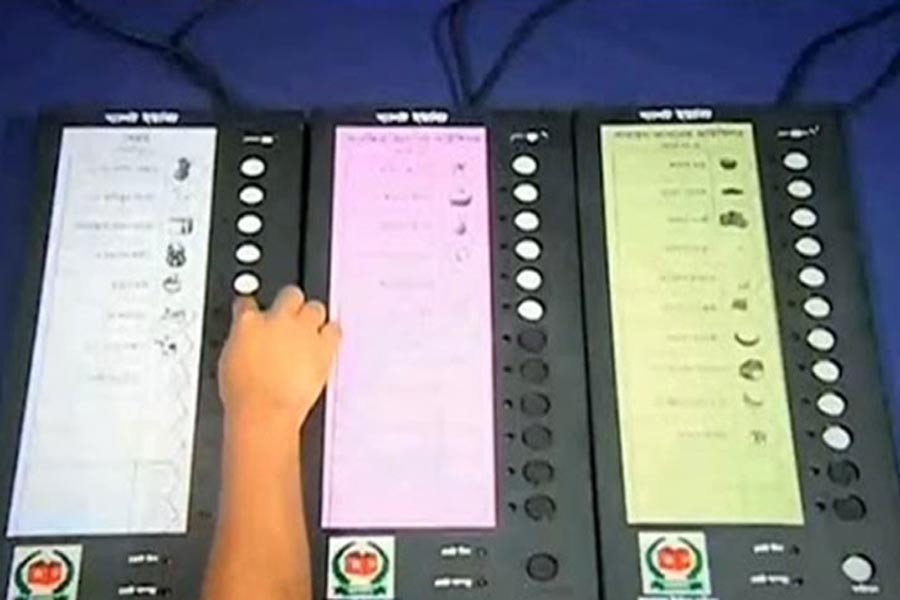A group of eminent citizens on Tuesday urged the Election Commission (EC) not to use electronic voting machine (EVM) in the 12th parliamentary election.
Terming it illogical, they said in a statement, "The EC, without any political consensus, has decided to use EVM in a maximum of 150 seats in the next general election."
On August 23, the EC announced that the EVM would be used in at least 150 constituencies in the election to be held between November 2023 and January 2024.
"Such decision may incite a political debate further and intensify the lack of confidence in the current commission, which may lead to another failed election," said the statement.
They considered EVM as a technically weak device as these machines do not have the Voter Verified Paper Audit Trail (VVPAT) system, which means that the voting results declared by the commission are final and cannot be recounted or audited.
"Because of that reason, the late Jamilur Reza Chowdhury, chairman of the technical advisory committee formed by the EC, didn't sign the proposal to buy EVMs in 2018," they mentioned in the statement.
The eminent citizens also informed that the VVPAT system was included in the EVMs in India following a directive from its Supreme Court. Expressing concern over the possibility of digital forgery through EVM, they said biometrics-based EVMs, in many cases, cannot identify voters.
So, they give the presiding officers concerned the authority to use their fingerprints to open EVM, thereby creating scope for deception.
Apart from other concerns, the most important thing is that a majority of the political parties did not reach a consensus to use EVM in the next elections.
The EC recently held a dialogue with 22 political parties. Fourteen of them expressed doubt about EVM use while at least nine directly opined against the EVM.
Only four parties, including the ruling Awami League, asked the EC to hold the vote through EVM.
Nine parties, including the Bangladesh Nationalist Party (BNP), which boycotted the dialogue, are also against the EVM.
Mentioning that the government spent around Tk 35 billion ($450 million) on EVM purchase before the 11th general election, they said, "If the EC wants to hold voting on EVM in 150 constituencies…, about half a billion dollar will be needed to buy new EVMs."
The EC officials earlier told the media that the commission currently has the capacity to hold elections using EVM in 70-75 constituencies.
The noted citizens have requested the EC to use its prudence before splurging such a staggering amount amidst the current economic crisis.
Only 13 countries in the world now use EVM while technologically-enriched countries like Germany, France and the Netherlands have stopped using it due to technical errors of such devices.
The signatories to the statement are Barrister M Amir-ul Islam, Dr Serajul Islam Choudhury, M Hafizuddin Khan, Dr Akbar Ali Khan, Md Abdul Matin, Dr Zafrullah Chowdhury, Dr M Sakhawat Hossain, Ali Imam Majumder, Dr Salehuddin Ahmed, Professor Parvin Hasan, Professor Tofail Ahmed, Dr Shahdeen Malik, Dr Debapriya Bhattacharya, Dr Shahidul Alam, Professor Anu Muhammad, Dr Ahsan H Mansur, Abdul Latif Mandal, Shamsul Huda, BD Rahmatullah, Syeda Rizwana Hasan, Professor Asif Nazrul, Rahnuma Ahmed, Lubna Marium, Professor Shapan Adnan, Sharmeen Murshid, Professor Ferdous Azim, Syed Abu Naser Bukhtear Ahmed, Abu Sayeed Khan, Kamal Ahmed, Zakir Hossain, Nur Khan Liton, Shireen Huq, Dr Badiul Alam Majumder, Saifur Rahman, Faruk Faisal, Sanjeeb Drong, Salma Ali, Dr M Niaz Abdullah and Foyez Ahmed Tayeb.


